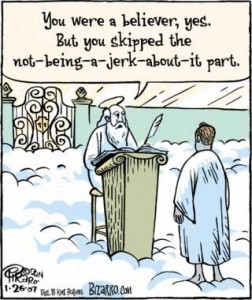 Let’s say you’re having a conversation with someone. Perhaps with a friend who has a different perspective from yours. As a thoughtful and considerate person, you want to understand your friend’s perspective. You dissect it, analyze each part, and in the process you ask questions whose answers can potentially dissolve the ground on which the perspective stands. But just like any one of us who has been so attached to our initial perspectives, your friend will attempt to escape this belief-threatening situation by uttering this effective conversation stopper: “I’m entitled to an opinion.” Along with “This is what God said…” and “Science proved it…”, this is one of those rhetorical abracadabras that when uttered will effectively close the cave of further investigation.
Let’s say you’re having a conversation with someone. Perhaps with a friend who has a different perspective from yours. As a thoughtful and considerate person, you want to understand your friend’s perspective. You dissect it, analyze each part, and in the process you ask questions whose answers can potentially dissolve the ground on which the perspective stands. But just like any one of us who has been so attached to our initial perspectives, your friend will attempt to escape this belief-threatening situation by uttering this effective conversation stopper: “I’m entitled to an opinion.” Along with “This is what God said…” and “Science proved it…”, this is one of those rhetorical abracadabras that when uttered will effectively close the cave of further investigation.
John Jackson aptly illustrates this so elegantly in this fictional dialogue between Tom and Jerry:
Tom: I believe X works.
Jerry: There’s no evidence to support the fact that X works.
Tom: Well, I believe that X works.
Jerry: X has been tested in scientific trials and was not found to work.
Tom: I’m entitled to my opinion.
In the non-fiction realm, this rhetorical abracadabra is currently being used by Manny Pacquiao.
The Christian Post Reporter recently featured Mr Pacquiao’s interview with the National Conservative Examiner. Reacting to US President Barack Obama’s support of extending State-sanctioned marriage to same-sex couples, Mr Pacquiao allegedly used Leviticus 20:13 as the basis of his objection. He allegedly reiterated the two elements in that verse. The rule: prohibition against men having sex with other men; and the punishment: they should be put to death. I say allegedly because according to this ABS-CBN news report, Mr Pacquiao denied saying what the Christian Post Reporter attributed to him. He even claimed that he has never read Leviticus. He defended himself, saying that he is not condemning gay people, but he is just voicing out his opinion: “Sinabi ko lang ang opinion ko na against the law of God ang same-sex marriage (I just said my opinion that same-sex marriage is against the law of God).”
In that statement, Mr Pacquiao used the two powerful rhetorical abracadabras at the same time: “God” and “I’m entitled to my opinion.” These two are actually the same thing: God is simply the non-secular version of the other. Using both devices in a sentence has the effect of attracting support from both the religious and the secular camp. Who would be against what the creator, owner, and master of the universe says? And who would be against someone exercising their right to speak? The secular version is of course subject to more argumentation than God. Hence, if you really want to stop someone from further questioning you, use “God” immediately. Miriam Quiambao did this after she was told that her truth was just one of the many truth-claims out there. She salvaged her perspective from being weighed by other perspectives by using the God argument. By elevating her opinion to the Heavens, her opinion transformed into an absolute, irrevocable, eternal, and infallible Truth to which everyone should bow. In the secular world, God is oftentimes replaced by science, so that whenever someone says that this is the truth because “Science says so…” one is often bullied into a corner and forced to give up further inquiry.
One of the consequences of further dissecting the claims of those who already uttered these rhetorical abracadabras is being accused of being disrespectful. “Why aren’t you respecting my/God’s/science’s opinion?” “Why are you not respecting my culture?” When the “respect me card” is thrown onto the table, any further challenges would be considered rude, cruel, and as we call it in our language, bastos. The situation will become very emotionally charged. The only way out of it is to calm the sea of emotions by just sailing away from the conversation. Sometimes this is called the “live and let live” strategy, to each-his-own-therefore-shut-up. But in the face of opinions — whether they are from gods, mortals, and scientists — should we just shut up? Sometimes we should. Sometimes we shouldn’t. The times that we should are probably during our private conversations when the interest of maintaining peace by shutting up outweighs the interest of further dissecting someone’s opinion or belief. Most of the time the latter interest outweighs the former.
Opinions are rarely without purpose. We don’t just happen to speak something; we are speaking because we want something: for other people to believe us. Mr Pacquiao, Ms Quiambao, and everyone who says something controversial are not simply sharing their thoughts, they want people to believe them. And believing is not a simple act. When you believe in something, you let it have a very powerful influence over your life. Indeed, we couldn’t live our lives without any belief of any kind; we may not be able to function at all without them. However, the importance of believing in something doesn’t preclude the importance of evaluation. The process of evaluation allows us to exercise our power to accept or reject opinions and claims. It is through this process that we give our consent to a claim for it to have an influence over us. Those who suggest that we believe and then evaluate later is like a salesman who wants us to pay him for a product that we have never seen. More importantly, without exercising this power, we give up one of the qualities that make us human: the faculty of reason.
we are speaking because we want something: for other people to believe us. Mr Pacquiao, Ms Quiambao, and everyone who says something controversial are not simply sharing their thoughts, they want people to believe them. And believing is not a simple act. When you believe in something, you let it have a very powerful influence over your life. Indeed, we couldn’t live our lives without any belief of any kind; we may not be able to function at all without them. However, the importance of believing in something doesn’t preclude the importance of evaluation. The process of evaluation allows us to exercise our power to accept or reject opinions and claims. It is through this process that we give our consent to a claim for it to have an influence over us. Those who suggest that we believe and then evaluate later is like a salesman who wants us to pay him for a product that we have never seen. More importantly, without exercising this power, we give up one of the qualities that make us human: the faculty of reason.
God and reason
Speakers of any kind shouldn’t demand listeners to immediately believe what they have said. They should encourage listeners to challenge and weigh their opinions. And instead of demanding blind faith, they should urge their listeners to fully investigate their claims. They should be humble enough to inform their listeners that they could be wrong. In the Buddhist tradition, the historical Buddha warned against people blindly believing in him, saying:
“Don’t blindly believe what I say. Don’t believe me because others convince you of my words. Don’t believe anything you see, read, or hear from others, whether of authority, religious teachers or texts. Don’t rely on logic alone, nor speculation. Don’t infer or be deceived by appearances. Do not give up your authority and follow blindly the will of others. This way will lead to only delusion.”
Even the God in the Bible allows people to question him. In Moral Clarity: A Guide for Grown-Up Idealists, Susan Neiman offers an elegant analysis of the implication of Abraham’s act of bargaining with God, who is hell bent on destroying Sodom and Gomorrah. (NB: Neiman argues that Sodom and Gomorrah was not destroyed because of homosexuality but because of their grave inhospitality: they wanted to gang rape Lot’s guest but were denied. And hospitality was a great deal during those days. As Neiman said, “…kindness to strangers forms the framework of civilization”).
The story goes like this…
Upon learning that God will destroy Sodom and Gomorrah, Abraham bargained with God. He asked God whether he will still destroy the city even if there are X number of innocent people there. Abraham was able to convince God to forego his plan if there are at least ten innocent people in the city. In this bargaining, “Abraham dares to remind the King of Kings that He’s about to trespass on moral law.” Neiman further adds, “If [Abraham] can make God stop and think…none of us is ever exempt.” Arguing and reasoning with God is not something that God forbids.
In He Who Sits in Heaven Shall Laugh: Divine Humor in Talmudic Literature, Hershey Friedman contends that “God is open to suggestions from mortals and is even willing to change His mind when proven ‘wrong’.” This is far from the infallibility of the word of God that is being promoted by those who are taking the Bible as if it is the last word about anything under the sun. When God is proven wrong, Friedman concludes, “[He] laughs when He realizes that mortals refuse to accept Him as the final authority on religious matters.” Friedman based his conclusion from this Jewish parable:
“Rabbi Nathan met Elijah the Prophet and asked him: What was God doing at that time [when His Heavenly voice was disregarded]? Elijah answered: He laughed and said: My children have triumphed over me. My children have triumphed over me.”
This a demonstration of the humility of God. Despite being considered as perfect, God still considers his words not final and irrevocable. And despite His omniscience, Friedman says, “God but laughs when bested by His children.” This characteristic of God is far from the arrogance of those who proclaim that they are simply reiterating what God allegedly said. He wants his children to practice their faculty of reasoning. And yes, I dare add, that He, just like the historical Buddha, would surely want His children not to blindly believe what He says. Neither does he want His children to believe him because others convinced them of His words. God didn’t create His children to be an echo.
No opinion is immune to criticism, to questioning, and to further investigation. Every opinion needs to be weighed against the feather of critical thinking. Every opinion, no matter where it comes from, needs to be challenged. Challenging, questioning, and criticizing an opinion are activities that weigh the validity of the opinion. They are expressions of the innate capacity of humans to reason. But sometimes, these activities are considered as a disrespectful act. It isn’t clear however whether it’s the opinion that is being disrespected or the one giving the opinion. Conflating the opinion giver and the opinion is always seductive. We see this conflation in the article published on the website of CBCP for Life, entitled Superficial idea of beauty may be seen in natural born men’s desire to be beauty titlists. Reacting to the criticisms received by Miriam Quiambao, writer Nicole Bautista was quoted as saying:
“I think Miriam Quiambao doesn’t deserve the flak she’s getting because one, she’s been diplomatic about it, and two, if everyone got blasted for saying something that somebody else disagreed with then no one should talk at all… It’s true that there is a limit to freedom of expression, that is when this freedom oversteps others’ rights, but Miriam Quiambao’s statement does not do this.”
This was further supported by a quote from a homeschooling mom named Stef Patag:
“Let’s face it, anti-Catholicism/anti-Christianity is the last acceptable prejudice. Tolerance is only real when it goes both ways. The LGBT crowd have their own beliefs, let Miriam have hers.”
It isn’t clear which “flak” Ms Bautista was referring to. I hope that she means the ad hominem attacks Ms Quiambao received after she twitted “Homosexuality is not a sin but it is a lie from the devil. Do not be deceived. God loves gays and wants them to know the truth.” Ad hominems are of course a no-no in the traditional rules of argumentation. But if Ms Bautista also wants people to just shut up and blindly accept Ms Quiambao’s statement, then she is contradicting her position about freedom of expression.
Freedom of expression doesn’t include freedom from criticism. Restricting criticism is actually a violation of freedom of speech. Indeed it takes courage to speak what you believe in public, but that courage shouldn’t stop when you’ve already said what you want to say. The speaker should also have the courage to accept the reaction that her expression will generate; and that courage should also include the humility and modesty to accept that her perspective is just one among the many. Saying that your perspective is the absolute truth because it comes from God is nothing but arrogance. And even if it comes from God it still needs to be challenged, evaluated, and weighed, just like how Abraham of the Bible challenged God’s initial decision.
Criticizing Ms Quiambao’s belief is not even equivalent to removing her right to believe what she wants to believe. This is even far from the religious persecution that Ms Patag implied in what she said. This criticism is not even a sign of disrespect for Ms Quiambao.
 But what is respect? Does respect mean acceptance? Let’s do an etymological investigation. Respect comes from the Latin word respectus, which means the “act of looking back at one;” and it is the past participle of respicere, which means to “look back at, regard, consider.” To respect Ms. Quiambao doesn’t meant that we should just accept her words, no matter where she thought they came from. To respect her is to treat her with regard. It is to consider her as your fellow human being who just happened to have a different perspective. To respect her is to allow her to express what she wants to say; but doing this doesn’t mean that you cannot react with civility to what she is saying. And about respecting an opinion? Opinions are not human beings that have rights. Rights regulate our relationship with one another and our relationship with the State. They were not created (of whoever you think created them – Gods or mortals) so that opinions will have the same status as people. More importantly, opinions are not sentient beings that need respect. What opinions need is evaluation. They need to pass through the critical eye of the needle of reason. Once they have entered that eye, that’s the time that any thinking individual should allow opinions to have the power to weave a story that s/he can believe. When that opinion fails to pass through that eye, let’s hope that those who consider their opinion as the infallible word of God do what their God does when proven wrong: laugh and be willing to change.
But what is respect? Does respect mean acceptance? Let’s do an etymological investigation. Respect comes from the Latin word respectus, which means the “act of looking back at one;” and it is the past participle of respicere, which means to “look back at, regard, consider.” To respect Ms. Quiambao doesn’t meant that we should just accept her words, no matter where she thought they came from. To respect her is to treat her with regard. It is to consider her as your fellow human being who just happened to have a different perspective. To respect her is to allow her to express what she wants to say; but doing this doesn’t mean that you cannot react with civility to what she is saying. And about respecting an opinion? Opinions are not human beings that have rights. Rights regulate our relationship with one another and our relationship with the State. They were not created (of whoever you think created them – Gods or mortals) so that opinions will have the same status as people. More importantly, opinions are not sentient beings that need respect. What opinions need is evaluation. They need to pass through the critical eye of the needle of reason. Once they have entered that eye, that’s the time that any thinking individual should allow opinions to have the power to weave a story that s/he can believe. When that opinion fails to pass through that eye, let’s hope that those who consider their opinion as the infallible word of God do what their God does when proven wrong: laugh and be willing to change.
God is not a fundamentalist.
Photo credits:
1 – Image by Mort Gerberg, Conde Nast Collection
2 – Interaksyon
3 – Image by David Hayward, Naked Pastor
4 – LOLROFLMAO.COM
5 – saintandcynic.blogspot.com



